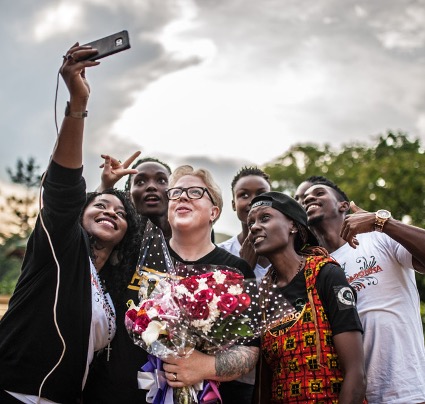Short Circuits..
Women and Dissidences Seeking to Collectivize and Produce Safe Spaces in (Electronic) Music
DOI:
https://doi.org/10.30827/sobre.v8i.25112Keywords:
electronic music, feminism, dissident minorities, music industryAbstract
In the 21st Century, just two decades in, the number of groups comprising women and gender dissidents devoted to electronic music has increased exponentially on a global level. They share an ongoing intent: to overcome the technological gap, facilitate access to training for new generations, and acknowledge the need for, and the importance of, queer feminist activism in the current electronic music scene. In this article, we briefly review the historical causes that have separated women from music technologies and the current actions being taken to break this chain of exclusions. In turn, we will survey the work and research of the founders and collaborators of some of the national and international groups that are currently being developed that share a common drive toward sisterhood and non-hierarchical organizational structures to create safe and inclusive spaces.
Downloads
References
Armstrong, V. (2011). Technology and the Gendering of Music Education. Routledge.
Beat By Girlz. https://www.beatsbygirlz.org
De Jaime Moleres, M. (2021, 1 de noviembre). La música como vehículo para construir un futuro basado en la sostenibilidad y el esfuerzo colectivo. El País. https://elpais.com/espana/paisvasco/2021-11-01/la-musica-como-vehiculo-para-construir-un-futuro-basado-en-la-sostenibilidad-y-el-esfuerzo-colectivo.html
Femme Electronic. https://www.santurisafari.org/femmeelectronic/
Female Pressure. https://www.femalepressure.net/
Femnöise. https://www.femnoise.com/es/acerca-de/
Gavanas, A. y Reitsamer, R. (2013). Dj technolgies, Social Networks and Gendered Trajectories in European DJ Cultures. En B. Attias, A. Gavanas y H. Rietveld (Eds.), DJ Culture in the Mix: Power, Technology, and Social Change in Electronic Dance Music (pp. 51-77). Bloomsbury Academic.
Katz, M. (2006). Men, Woman and Turntables: Gender and the Dj Battle. The Musical Quarterly, 89(4), 580-599. https://doi.org/10.1093/musqtl/gdm007
Malek, M. (2020, 24 de julio). Natalia San Juan: la emprendedora uruguaya que combate la brecha de género en la música. El País. https://www.elpais.com.uy/eme/mujeres/natalia-san-juan-emprendedora-uruguaya-combate-brecha-genero-musica.html
Rodgers, T. (2010). Pink Noises: Women on Electronic Music and Sound. Duke University Press.
Rodgers, T. (2015). Cultivating Activist Lives in Sound. Leonardo Music Journal, (25), 79-83.
San Juan, N. (2021, 29 de septiembre). Femnöise Fest, el primer festival gamificado de 13alent emergente de mujeres y disidencia. Femnöise. https://www.femnoise.com/femnoise-fest-festival-gamificado/
San Juan, N. (2021, 30 de noviembre). Información etnomusicológical [Correo electrónico].
Tuna Pase. (2022, 25 de enero). Sobre proyecto BBG [Correo electrónico].

Downloads
Published
How to Cite
Issue
Section
License
Aquellos autores/as que tengan publicaciones con esta revista, aceptan y certifican los términos siguientes:
· Que ha contribuido directamente al contenido intelectual del trabajo, del cual se hace responsable a todos los efectos.
· Que aprueba los contenidos del manuscrito que se somete al proceso editorial de Revista SOBRE, y por tanto está de acuerdo en que su nombre figure como autor.
· Que el contenido del artículo no ha sido publicado y que tampoco figura en otro trabajo que esté a punto de publicarse.
· Que se compromete a no someterlo a consideración de otra publicación mientras esté en proceso de dictamen en Revista SOBRE, ni posteriormente en caso de ser aceptado para su publicación.
· Que no ha tenido ni tiene, relaciones personales o financieras que puedan introducir prejuicios y sesgos en el desarrollo o los resultados del presente trabajo.
· Que han sido mencionadas en el epígrafe de agradecimientos todas aquellas personas que, habiendo otorgado su permiso para tal mención, han contribuido de manera sustancial al desarrollo del trabajo.
· Que se compromete a facilitar, cuando así lo requiera la revista, el acceso a todos los datos y fuentes en los que se funda el trabajo presentado.
· Que participará activamente en la realización de todas aquellas modificaciones de estilo u ortotipográficas que sean necesarias para la publicación del trabajo cuando así se lo notifique el equipo editorial de la revista.
· Que no ha violado, ni violará, las leyes y derechos humanos o animales durante el proceso de investigación y publicación de este trabajo.
· Que ninguna de las instituciones en las que desarrolla su labor científica e investigadora ha presentado objeciones con respecto a la publicación del manuscrito que se somete a evaluación.
· Que todos los datos y las referencias a materiales ya publicados están debidamente identificados con su respectivo crédito e incluidos en las notas bibliográficas y en las citas que se destacan como tal y, en los casos que así lo requieran, cuenta con las debidas autorizaciones de quienes poseen los derechos patrimoniales.
· Que los materiales están libres de derecho de autor y se hace responsable de cualquier litigio o reclamación relacionada con derechos de propiedad intelectual, exonerando de responsabilidad a Revista SOBRE.
· Que en caso de que el trabajo sea aprobado para su publicación, autoriza de manera ilimitada en el tiempo a la entidad editora para que incluya dicho texto en Revista SOBRE y pueda reproducirlo, editarlo, distribuirlo, exhibirlo y comunicarlo en el país y en el extranjero por medios impresos, electrónicos, CD, Internet o cualquier otro medio conocido o por conocer.










